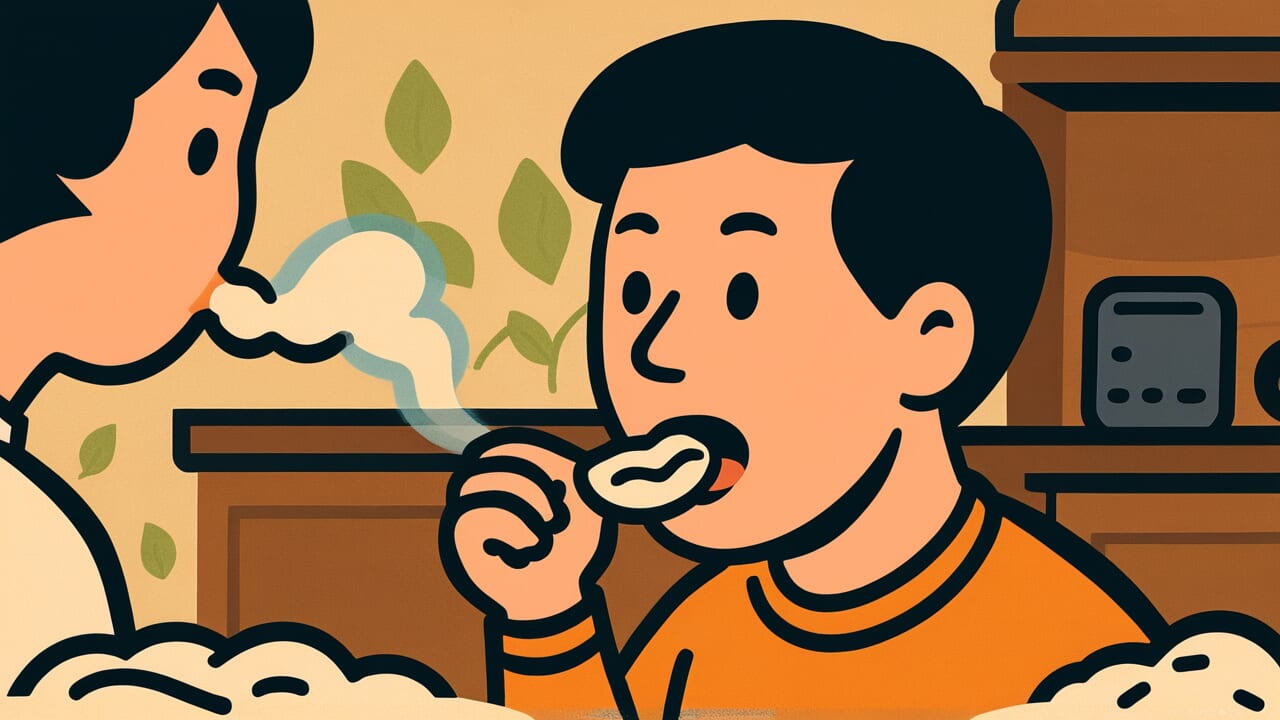How to Read “Even powdered rice becomes sweet if you chew it”
Komai mo kameba amaku naru
Meaning of “Even powdered rice becomes sweet if you chew it”
“Even powdered rice becomes sweet if you chew it” means that even the most humble things can become valuable with the right effort and creativity.
Something that seems worthless or useless at first can reveal unexpected value when you take time with it, apply ingenuity, or handle it carefully.
This proverb is used when making the most of limited resources without waste. For example, it encourages people who can create something wonderful from old tools or leftover materials through ideas and effort.
It also teaches people who complain about their abilities or circumstances to make the most of what they already have.
Today, as we work toward a sustainable society, this idea of “creating value through ingenuity” is gaining renewed attention.
Origin and Etymology
No clear written records explain the origin of this proverb. However, we can make interesting observations from how the phrase is constructed.
“Powdered rice” refers to rice grains broken during milling or rice ground into powder. In Japan before the Edo period, rice was precious food.
Broken rice was considered less valuable than whole grains. It sold cheaply or was sometimes used as animal feed because of its lower market value.
However, when you chew this powdered rice well, enzymes in your saliva break down starch into sugar. This creates a sweet taste.
People in old times knew this physiological phenomenon from experience.
This proverb likely emerged from such everyday eating experiences. Powdered rice looks humble and seems low in value.
But if you take time to chew it carefully, you can draw out sweetness as its value. This concrete experience evolved into a life lesson.
It teaches that “even things that seem worthless can become valuable through effort and ingenuity.” This wisdom grew from daily life in a culture where rice was the staple food.
Interesting Facts
Rice becomes sweet when chewed because of amylase, a digestive enzyme in saliva. This enzyme breaks down starch into maltose, creating sweetness.
This mechanism is also used in sake brewing. Ancient kuchikamizake (mouth-chewed sake) used exactly this principle for fermentation.
In the Edo period, powdered rice was also called “broken rice” or “chipped rice.” It sometimes sold for less than half the price of regular rice.
However, common people valued it as material for dumplings and rice crackers. This developed practical wisdom for using every part of rice without waste.
Usage Examples
- This project has a small budget, but even powdered rice becomes sweet if you chew it, so let’s create the best thing possible with what we have
- Even powdered rice becomes sweet if you chew it applies to these old tools too—with proper care, they should still work well
Universal Wisdom
“Even powdered rice becomes sweet if you chew it” teaches us a profound truth. Value is not fixed—it emerges from how we engage with things.
Humans constantly seek “better things.” We tend to think new, perfect, or expensive things have value.
But doesn’t true abundance lie in the ability to draw maximum value from what we already have? This proverb shines light on this essential human challenge.
For humble powdered rice to become sweet requires the act of “chewing.” This is not just a physical motion.
It symbolizes taking time, not sparing effort, and engaging carefully. Modern society values instant results and efficiency.
But our ancestors understood that true value only appears when we invest time and labor.
This proverb also warns against “wanting what we don’t have.” While chasing distant ideals, we overlook possibilities right at our feet.
It gently admonishes this human weakness while teaching the importance of looking at what we have now.
The universal truth here is that human creativity and ingenuity shine brightest within limited conditions.
When AI Hears This
Rice becoming sweet when chewed is a chemical reaction. Amylase enzyme in saliva cuts large starch molecules into smaller maltose sugar molecules.
The key point is that this reaction is “time-dependent.” The longer you chew, the more starch converts to sugar, increasing sweetness.
Interestingly, reaction speed depends heavily on temperature and contact area. The mouth maintains about 37 degrees Celsius, the optimal temperature for amylase activity.
Chewing also breaks rice into fine pieces, dramatically increasing the surface area where enzymes can work.
For example, chewing rice 10 times versus 100 times creates dozens of times more surface area for enzyme action.
This phenomenon demonstrates the concept of “activation energy” in chemical reactions. Starch is originally a collection of sweet sugars.
But the molecules are too large to bind to sweetness receptors. Only when physical energy from chewing combines with enzyme catalysts does the property of “sweetness” emerge.
In other words, this proverb embodies a basic principle of chemical reactions. To make potential value visible requires appropriate conditions and continuous action.
Lessons for Today
This proverb teaches modern people a hopeful message: “Constraints themselves become the source of creativity.”
We often wait for ideal environments or perfect conditions. We think, “If only I had better tools, more time, or a bigger budget.”
But this proverb teaches us differently. What you have now, even if it seems humble, can become valuable through your ingenuity and effort.
In modern society, constantly consuming new things has become normal. But doesn’t true abundance come from cherishing what we have and drawing out its full potential?
Remaking old clothes, creating new dishes from leftover ingredients, being creative with a limited budget—these small acts of ingenuity accumulate to enrich your life.
What matters is continuing to engage without giving up. Powdered rice becomes sweet because you keep chewing it.
Why not take another look at the “powdered rice” in your own hands?



Comments